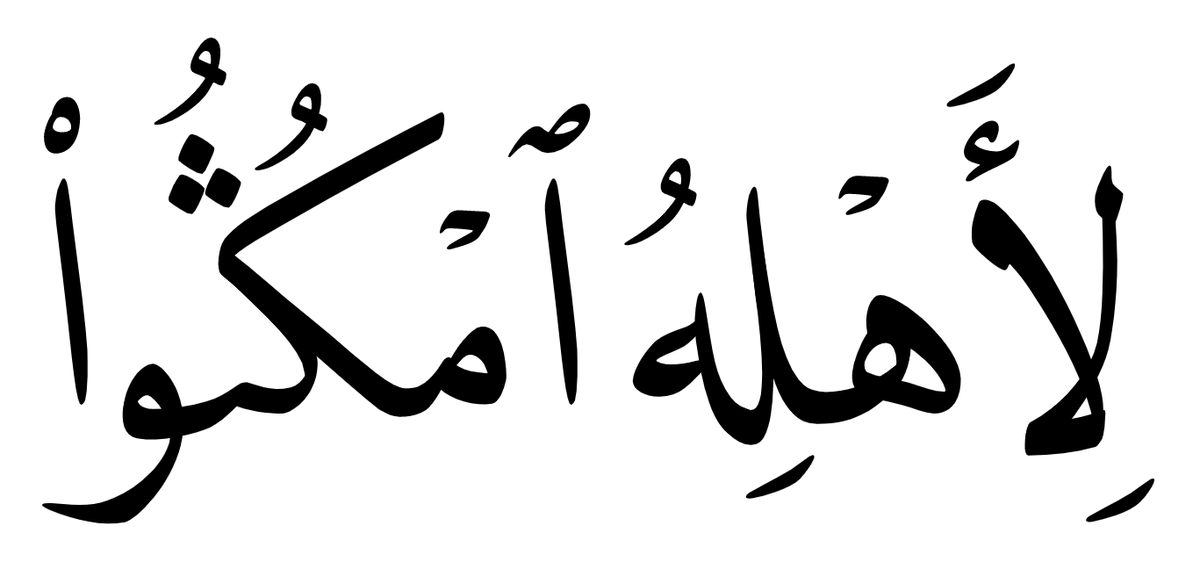One of the big mysteries of the Quranic reading traditions, to me, is the when and why of the many many irregularities that occur in them. Most readers follow a more or less regular set of grammatical rules, only to break it just one single time in the whole Quran.
>THREAD
>THREAD

Ḥamzah follows the textbook Classical Arabic pronominal system for the singular pronoun -hū/-hu/-hī/-hi. It harmonizes to -hī/-hi if i, ī or ay precedes, and it is long -hū /-hī if a short vowel precedes (if not followed by two consonants). But he breaks this rule in one case:
When the phrase فقال لاهله امكثوا "so he said to his family: stay" occurs (Q20:10; Q28:29), he fails to harmonize the the pronoun and reads fa-qāla li-ʾahli-hu mkuṯū, rather than the regular fa-qāla li-ʾahli-hi mkuṯū.
Why the irregularity? Why this phrase?
Why the irregularity? Why this phrase?
There's nothing specific about this phrase that would obviously trigger the irregularity. All other readers just have the expected fa-qāla li-ʾahli-hi mkuṯū, so clearly there is nothing wrong with it either.
One also cannot make the case that this is such a specific and rare phonetic environment, that it is regular, but no other environments exist that would have triggered the same behaviour, e.g. -i-hi before a CCuCū imperative occurs elsewhere: qāla mūsē li-qawmi-hi ḏkurū (Q14:6).
He is not the only person to make such an unusual exception with the pronouns. Q6:46 به انظر represents a very similar environment, read by most (including Ḥamzah) as bihi nẓur, but Warš ʿan Nāfiʿ according to the path of al-ʾAṣbahānī reads this as bihu nẓur. Why is this?
The medieval Islamic tradition is surprisingly disinterested in such exceptions. Sometimes a comment will be made "saying -hu" in this case is the dialect of Qurayš, but any explanation *why* a reader would stick to the Qurašī form here and only here is never explored.
One might wonder whether the disinterest has to do with the model of revelation that the medieval Muslims had: The prophet revealed it this way and therefore it must be followed.
As the other manner also exists makes this explanation unattractive, let's explore a clear example:
As the other manner also exists makes this explanation unattractive, let's explore a clear example:
The accusative of ṯamūd is spelled ثمودا four times in the Quran (Q11:68; Q25:38; Q29:38; Q53:51), the spelling suggests ṯamūdan, but this is point of disagreement in the reading.
Most readers read ṯamūdan, whereas Ḥafṣ, Ḥamzah and Yaʕqūb ignore the rasm and read ṯamūda.
Most readers read ṯamūdan, whereas Ḥafṣ, Ḥamzah and Yaʕqūb ignore the rasm and read ṯamūda.
As all these readers are canonical, and considered uncontroversially trustworthy transmitters within the Islamic model, internal logic of the tradition requires one to conclude that in all four cases the prophet has pronounced it BOTH as ṯamūdan AND ṯamūda...
But then we turn to Šuʿbah, the other transmitter of ʿĀṣim, who follows the majority opinion in reading ṯamūdan for Q11:68, Q25:38, Q29:38 but breaks this pattern with Q53:51 where he reads ṯamūda!
So, Šuʿbah's exception cannot really be attributed to prophetic example.
So, Šuʿbah's exception cannot really be attributed to prophetic example.
And to my knowledge such forms indeed don't usually get explained in such manner (if at all), nor is there much of an attempt to find mystical symbolism to these one time exceptions, which have no effect on the meaning, have no obvious salience in the context etc.
Therefore it seems that most of these exceptional choices seem to have been choices by the readers (whether the options they chose from were believed to be prophetic is not so important here), but any memory of the motivation for these choices seems to have been lost completely.
If you enjoyed this thread and want me to do more of it, please consider buying me a coffee.
https://ko-fi.com/phdnix .
If you want to support me in a more integral way, you can become a patron on Patreon!
https://www.patreon.com/PhDniX
https://ko-fi.com/phdnix .
If you want to support me in a more integral way, you can become a patron on Patreon!
https://www.patreon.com/PhDniX

 Read on Twitter
Read on Twitter


